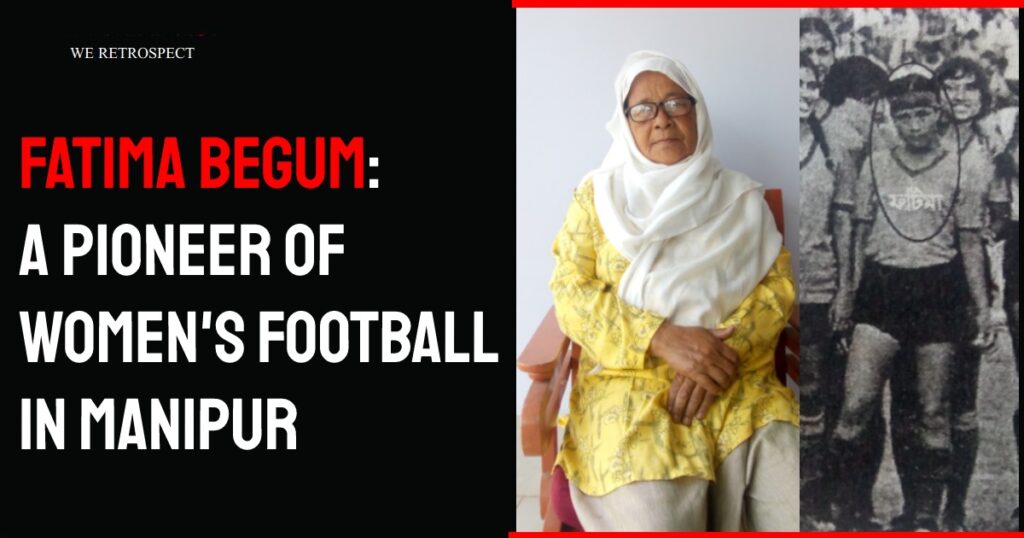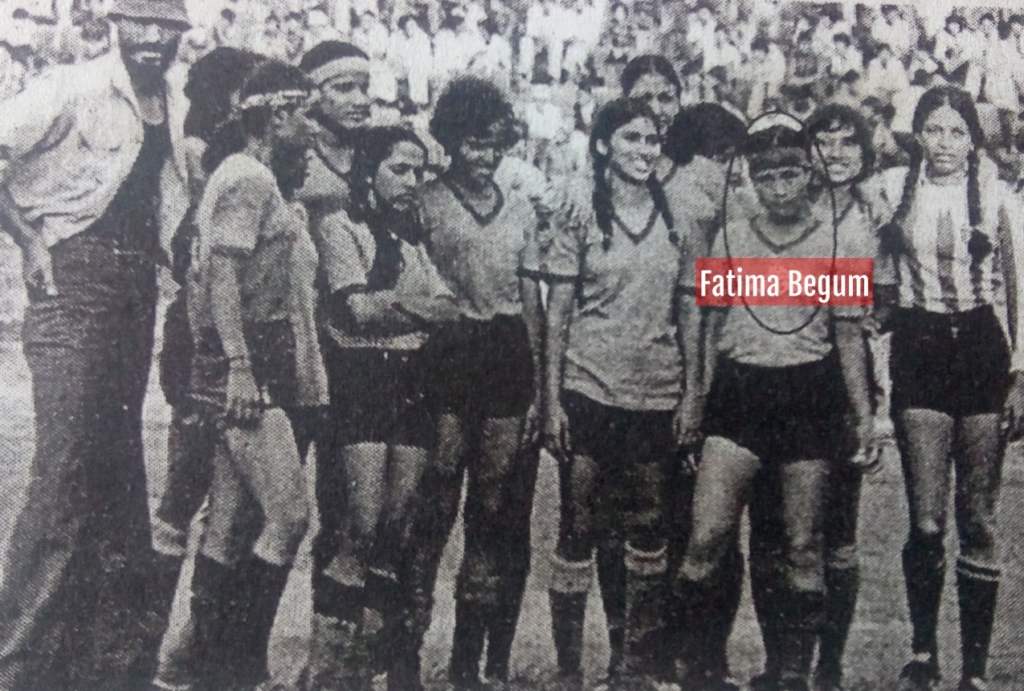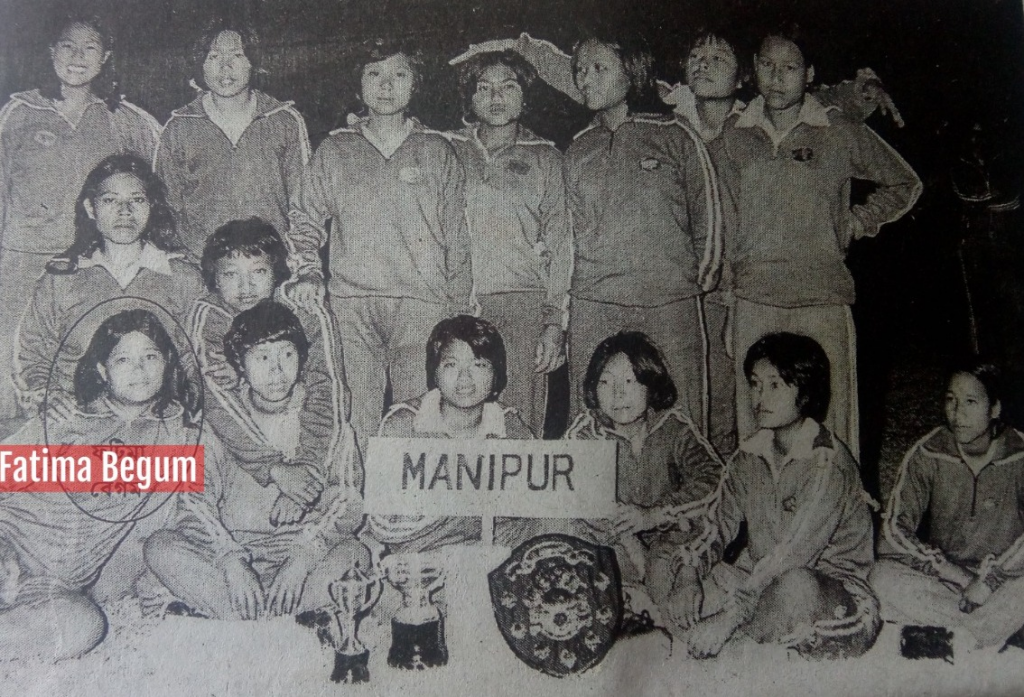Kshetri Awang Leikai (Porompat sub-division of Imphal East District), MANIPUR:

Fatima Begum, a pioneer of women’s football in Manipur, started playing football since her childhood days. She started playing football in a small playground in Kshetrigao among boys. They used to stuff torn footballs with clothes and sometimes even stole nobab (pomelo) and played with it.
From State to International Level
When the women football tournament first started in Manipur, she joined the Eastern Sporting Union. She belonged to the first batch of women football players. Back in her days, the government did not spend much money in promoting sports and games in Manipur. She says that generous people like Yambung Nimai who were interested in football helped her buy boots and football. They even provided money for her diet as she could not afford it. She became part of the Manipur team around 1974-75 and also captained the team for three years. After playing at the national level, she was called to Kolkata for a camp. She says, “Amusana, late Chawui, late Bijyalakhsmi and I were called there and that was how we joined the Indian team.”
At international level, she also played against the England team in Manipur. The match happened in Polo ground. It was a friendly match to raise some funds. She also played against the Nepal team in Kathmandu. Remembering her visit to Kathmandu, she says, “It was the first time I had gone to a foreign country. Earlier we had opportunities but given that we did not have money, I could not go. We always have seven-eight players from Manipur in the Indian team. In our time also, there would be five-six players.”

According to Salam Irene’s book, The Muslims of Manipur, “Fatima Begum of Kshetri Awang Leikai was a member of the India eleven team that played at Bhirt Nagar, Nepal in 1975. She captained the Manipur team that played against the UK football team at Imphal. Fatima was the first Muslim player of the North-east in this discipline.”
Paving Ways for Many
She laughed telling us that she failed the matriculation exam five times. Fatima recollects, “My family’s economic situation was not good. Playing football was very tiring. So, it was hard for me to study. I was not good in studies. Finally, I did clear the matric exam. I did not study much. I did not take much interest in it. Football was always on my mind. I liked sports.” She told us that she also played other sports such as handball, softball and other track sports at national level. According to her, there were not many good women athletes at that time. “I was good at those things,” she says, “so, I got selected.” Having said that, she feels that the situation of women in sports has improved considerably compared to those days.
During those days, she says that she was the only pangal woman in the football team. After her, there were one or two pangal women who joined the team. She says, “Now, there are many good players. The one from Khutheibam, I do not remember her name. We call her Thoibi. She played in Eastern Sporting Union. There is another one called Bukshera. Kashmina is also another one. She is famous now. She lives in mainland India.”
Regarding the support she got from her family and community, she tells us, “My family was alright with me playing sports. The community was reluctant at that time. In the villages, there was purdah system. They did not like the clothes we were wearing while playing. So, they were a little unhappy. But I continued playing football anyway.” When asked about the situation of pangal women in sports these days, she says, “These days, things are much better. Now, we think that we should participate in sports. It is not about looking down at my community. We should also preserve our religion but at the same time, we should also be participating in these things.” Nowadays, she says, there are lots of pangal women in sports such as Judo, Taekwondo and racing.
Experiences and Memories
Regarding her experiences while she was playing football, she says that “at times, we suffered because we had to travel without any reservation on the train in crowded compartments. There would be no place to stand even. On the other hand, there were also times when the whole compartment would be reserved for us. We would sing and play music and enjoy ourselves.” The most pleasant of the memories she says was her visit to Goa. She says, “They are good people. They welcomed us nicely. They played nicely and took care if we got injured. They have discipline.” Regarding her unpleasant experiences she had during her career, she says, “The most unpleasant experience I had was in Kolkata, Bengal. They did not care about us. They would kick on our knees, they would attack our calves. They wanted us to fall down and get injured. They would attack our good players like that.” Furthemore, she says, “Bengalis are a little cunning. They controlled the selection process for the Indian team. So, they selected mostly their people. They are not good people. Goa and Maharashtra are a little better. Manipur and Bengal will always confront in the finals at the national level. They are hard to deal with.”

When we asked her about the goals she scored, remembering her friend Amusana, she said, “When I was in Eastern Sporting Union, Amusana was a stopper. I was the striker. Her long kick was beautiful. I can run really fast. People say that the horse is running. She would start the ball. I would give the ball back to her and she would immediately do a long kick. There was an understanding between us. The moment I passed the ball to her I would run really fast. And, she would pass it to me. That is how we scored easily. At that time, there were no good women players. I teamed up with her, that was why I could do that. She could do that because I was there. Given that we have two-three good players, we managed that. But it became boring if we scored a lot of goals. If we scored around twelve-thirteen goals, then it became boring.” When asked about the match when she scored the most goals, she says, “I think it was in Pondicherry. I scored seven goals. I was becoming famous that time. I could not score much against Goa and Bengal because they had better players.”
Post-Retirement Days
After she joined the state’s sports department, it became her responsibility to take the teams for matches as a coach.
At times, she would take a friend from another sports department as a manager if others did not agree to go with her. “If the people who work with me on football did not want to go,” she says, “I would take someone from other sports.”
Post her retirement from playing, she has been actively participating in improving sports facilities and helping those interested in football, especially women. She used to support the club KIYC in her locality monetarily. She is also supporting some women players in the locality. She proudly tells us one of the players she supported is playing in KRYPHSA, Naoremthong. She has also sent some Muslim women in Chaoba’s team. Chaoba is her junior, who is now the assistant coach of the Indian team. There are some women also from her locality in Eastern Sporting Union. Fatima is grooming them.
source: http://www.weretrospect.com / We Retrospect / Home> History / by We Retrospect / January 25th, 2021








